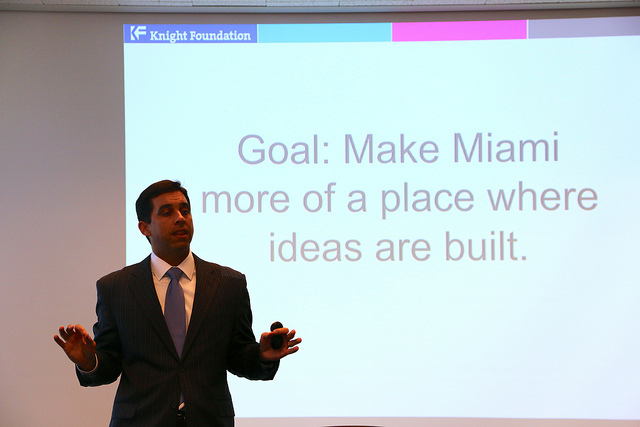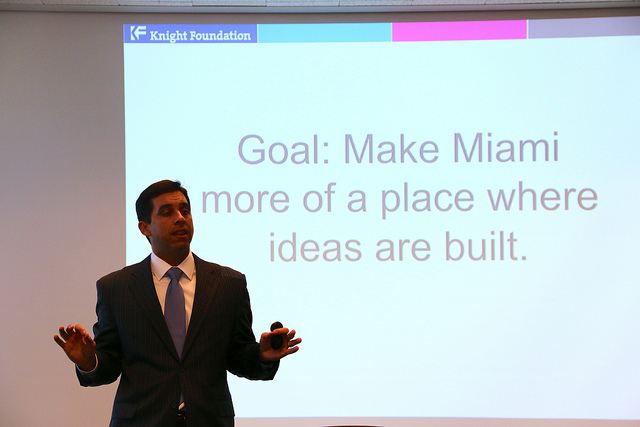
Delegation from Italy visits Miami for lessons in community building
Photo: Italian delegates are hosted by the Miami Downtown Development Authority for a roundtable discussion on community development. Left to right: Cristina Tajani, Mariachiara Fornasari, Alessandro Cattaneo, Simona Molisso and Gerardo Ausiello. Credit: Carolina Wilson.
Miami’s growth in urban entrepreneurship has increasingly attracted the attention of leaders from other countries, and last week a delegation from Italy visited South Florida to learn more about developments in the region’s business sector.
Miami Program Director Matt Haggman.
The U.S. Department of State’s International Visitor Leadership Program invited four government officials and a journalist to the area. They experienced a short visit to Washington, D.C., but then traveled to Miami, where the Miami Council for International Visitors hosted them.
They included journalist Gerardo Ausiello; Alessandro Cattaneo, a member of the Pavia City Council; Mariachiara Fornasari, a lawyer and former member of the Brescia City Council; Simona Molisso, a member of the Naples City Council; and Cristina Tajani, a councilmember from Milan.
Friday morning the visitors participated in a roundtable discussion on economic development models, hosted by the Miami Downtown Development Authority. Matt Haggman, Miami Program director of Knight Foundation, Pamela Fuertes from The Beacon Council and Alyce Robertson, executive director of the development authority, spoke about entrepreneurship and business investment.
Haggman shared Knight’s strategy for the local community. Over the past two years, Knight has invested about $6.5 million in more than 70 entrepreneurial efforts in Miami.
“We hope to see a greater community of problem-solving and a greater sense of possibility,” Haggman said. “All successful cities are built around the ability to attract and retain talent and the hope is that through this initiative Miami would be able to do that.”
Haggman said by funding entrepreneurship Knight is investing in community building.
“The cost to create and do continues to go down. The cost to connect is virtually zero,” he said. “The ability to organize and lead efforts has gone up exponentially. The thought was, we can use entrepreneurship as a tool to build community.”
By funding ideas, individuals and groups seeking to make an impact can thrive. Haggman said this trend is happening in cities all over the world, but Miami has unique qualities.
Haggman referenced an annual study by the Ewing Marion Kauffman Foundation, which has ranked Miami’s entrepreneurial activity in the top five U.S. metropolitan areas for each of the past five years.
“The psychology of entrepreneurship, of risking and of starting new ventures is very much in the ‘Miami DNA,’” Haggman said. “It’s very much who Miami is.”
The Beacon Council, an economic development organization, aims to retain local talent by providing resources and information about business costs and labor training.
“One of the most important decisions that drive companies to invest in our community is ‘Will I find a trained workforce?’” Fuertes, the vice president of international and economic development for The Beacon Council, said. “What we do is inform the company about our labor force and try to connect the company with an agency that can help them find the qualified trained employees that they need.”
The Miami Downtown Development Authority focused on developing Miami’s downtown community. As an example, Robertson shared information on the organization’s “clean and safe” initiative.
“We have a program called ‘the downtown enhancements team’ where homeless people are cleaning up the streets. In exchange, we pay for their services for a nine-month period of time,” Robertson said. “The program helps rehabilitate these community members, while also cleaning up our streets.”
All of the speakers said their work in investing in the Miami community also respects the city’s cultural diversity.
“Over 75 percent of Miami residents are from someplace else and over half Miami residents are foreign born,” Haggman said. “So it’s a really, really rich environment that continues getting more international as we push through as a city.”
The delegation planned to continue its U.S. tour with visits to Minneapolis, Minn., Portland, Ore., and Cleveland.
Recent Content
-
Communitiesarticle ·
-
Communitiesarticle ·
-
Communitiesarticle ·



